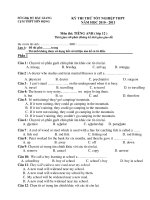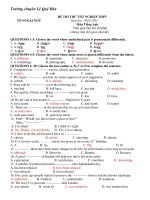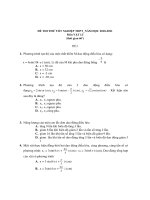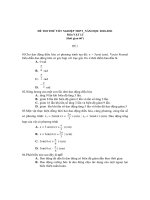ĐỀ THI THỬ TỐT NGHIỆP THPT NĂM HỌC 2010- 2011 Môn thi: Tiếng Anh - Bài số 6 docx
Bạn đang xem bản rút gọn của tài liệu. Xem và tải ngay bản đầy đủ của tài liệu tại đây (148.6 KB, 2 trang )
SỞ GD & ĐT THANH HOÁ ĐỀ THI THỬ TỐT NGHIỆP THPT
TRƯỜNG THPT CẨM THỦY 1 NĂM HỌC 2010- 2011
Bài số 6 Môn thi: Tiếng Anh –hệ 3 năm
Chọn từ/cụm từ thích hợp (ứng với A hoặc B, C, D) để hoàn thành mỗi câu sau.
Câu 1: She finally finished at 7 p.m. and served dinner.
A. being cooked B. cooking C. to be cooked D. to cook
Câu 2: Are you in knowing all the answers?
A. frightened B. amused C. interested D. excited
Câu 3: Peter at the moment, so he can't answer the telephone.
A. has worked B. worked C. works D. is working
Câu 4: We’ll be late we hurry.
A. unless B. when C. if D. because
Câu 5: English is an language to learn.
A. easy B. easiness C. easily D. ease
Câu 6: Mary me an hour ago.
A. was phoning B. phones C. phoned D. has phoned
Câu 7: He's not a mechanic. He’s a .
A. scholar B. schooling C. scholarship D. school
Câu 8: The house was very small they enjoyed living there.
A. but B. as C. since D. because
Câu 9: They worked for an hour and then they stopped a rest.
A. to have B. has C. have D. to having
Câu 10: Bill: "Who is going with you to the festival?" Kate: "No one. I by myself."
A. go B. am going C. went D. was going
Câu 11: Nancy plays the piano beautifully than I do.
A. quite B. as C. most D. more
Câu 12: There is water in the bottle.
A. few B. many C. a number of D. a little
Câu 13: The light went out while I dinner.
A. was having B. have C. am having D. have had
Câu 14: Nowadays it is not easy a well-paid job.
A. find B. finding C. found D. to find
Câu 15: Mary in London for 15 years.
A. has lived B. was living C. lives D. is living
Câu 16: They took her to the International Hospital, is only a mile away.
A. in which B. that C. where D. which
Câu 17: She is fed up washing the dishes everyday.
A. of B. by C. with D. to
Câu 18: Jane: "How are you today, Thomas?" Thomas: " ."
A. Thanks B. Yes, thanks C. Fine, thanks D. No, thanks
Câu 19: One of the diseases mankind has ever faced is cancer.
A. best B. better C. worst D. worse
Câu 20: They would like to live in a country there is plenty of snow in winter.
A. which B. where C. when D. that
Câu 21: I don't mind you home if you are tired.
A. drives B. drive C. driving D. to drive
Câu 22: In 1980, he came to Hollywood, he became a film star.
A. that B. where C. which D. when
Câu 23: I don't like stories have an unhappy ending.
A. whose B. when C. where D. which
Câu 24: While I along the road, I saw a friend of mine.
A. had cycled B. was cycling C. cycled D. have cycled
Câu 25: Some of the students enjoy reading detective stories, others do not.
A. when B. if C. whereas D. since
Chọn từ (ứng với A hoặc B, C, D) có phần gạch chân được phát âm khác với những từ còn lại trong mỗi câu sau.
Câu 26: A. threat B. thin C. those D. thank
Câu 27: A. state B. plan C. plane D. lake
Câu 28: A. accompany B. accident C. occur D. occasionally
Câu 29: A. meat B. reach C. head D. teach
Câu 30: A. garden B. various C. farm D. harm
Chọn phương án đúng (ứng với A hoặc B, C, D) để hoàn thành mỗi câu sau.
Câu 31: I enjoy spending on the beach.
A. in summer holiday B. a holiday summer
C. holiday summer D. my summer holiday
Câu 32: The furniture was .
A. such expensive that I didn't buy it B. enough cheap for me to buy
C. so expense that I did buy it D. too expensive for me to buy
Câu 33: Although the sun was shining, .
A. it wasn’t very hot B. it was very hot C. yet it was very hot D. but it was very hot
Câu 34: and you will succeed.
A. If only you work hard B. If you work hard
C. Working hard D. Work hard
Câu 35: A person is a lecturer.
A. who at the university teaches B. teaches at the university who
C. who teaches at a university D. whom teaches at the university
Xác định từ/cụm từ có gạch dưới (ứng với A hoặc B, C, D) cần phải sửa để những câu sau trở thành chính xác.
Câu 36: My father’s office are on the second floor.
A B C D
Câu 37: Walk in the rain helps him relax.
A B C D
Câu 38: Have you finished reading the English magazine which I lend you two weeks ago?
A B C D
Câu 39: She was waiting nervous in the waiting room for the interview.
A B C D
Câu 40: Children are fond with swimming in summer.
A B C D
Đọc kỹ đoạn văn sau và chọn phương án đúng (ứng với A hoặc B, C, D) cho mỗi chỗ trống từ 41 đến 45.
Lindsay Lewis is married with four children. In 1969 he (41) to Cambridge University and took a
degree in economics. From 1972 to 1978 he taught (42 India and Japan. He returned to England to do
research at Bristol University. He has lived in Fairfield (43) seven years and he is now the principal of a
technical college. He was the chairman of Fairfield Education Committee in 1986. He was also a member of the
Public Health Council for two years. In 1987 he (44) his best essay on education. He always wants to
improve (45) and the government health services. His hobbies are swimming, playing chess, and collecting
foreign coins.
Câu 41: A. go B. gone C. went D. goes
Câu 42: A. at B. for C. on D. in
Câu 43: A. during B. for C. since D. after
Câu 44: A. wrote B. writing C. written D. writes
Câu 45: A. education B. educator C. educational D. educate
Đọc kỹ đoạn văn sau và chọn phương án đúng (ứng với A hoặc B, C, D) cho mỗi câu từ 46 đến
50.
Parents send their children to school to prepare for the time when they grow up. Children learn their native
language so that they will be able to communicate fluently with other people around them. Moreover, they can
preserve the valuable culture and literature of their country. They learn foreign languages in order to benefit from
other countries’ heritage. The more foreign languages they learn, the more benefits they get. Children also learn
mathematics to calculate, geography to know about nature, and history to know about human beings and historical
events. Nearly everything they study at school has some practical uses in their life.
Câu 46: Parents send their children to school to
A. learn English B. play better
C. make them grow up D. prepare for their future
Câu 47: Why do children have to learn their native language?
A. To communicate fluently with other people around them. B. To learn foreign languages.
C. To know about nature. D. To benefit from foreign countries' heritage.
Câu 48: According to the passage, children learn history to know about
A. the mankind B. people and historical events
C. practical uses in life D. events of the history
Câu 49: How many school subjects are mentioned in the passage?
A. Four B. Seven C. Five D. Six
Câu 50: Most of the things children learn at school
A. have some practical uses B. are useless
C. have no use D. are not necessary
- THE END -









